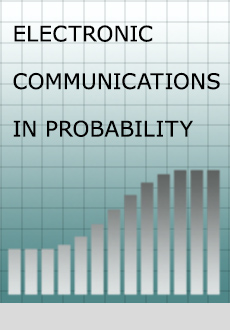Abstract
Abstract. Let $H(t,x)$ be the Hopf-Cole solution at time t of the Kardar-Parisi-Zhang (KPZ) equation starting with narrow wedge initial condition, i.e. the logarithm of the solution of the multiplicative stochastic heat equation starting from a Dirac delta. Also let $H^{eq}(t,x)$ be the solution at time $t$ of the KPZ equation with the same noise, but with initial condition given by a standard two-sided Brownian motion, so that $H^{eq}(t,x)-H^{eq}$ is locally of finite variation. Using the same ideas we also show that if the KPZ equation is started with a two-sided Brownian motion plus a Lipschitz function then the solution stays in this class for all time.
Citation
Jeremy Quastel. Daniel Remenik. "Local Brownian property of the narrow wedge solution of the KPZ equation." Electron. Commun. Probab. 16 712 - 719, 2011. https://doi.org/10.1214/ECP.v16-1678
Information





